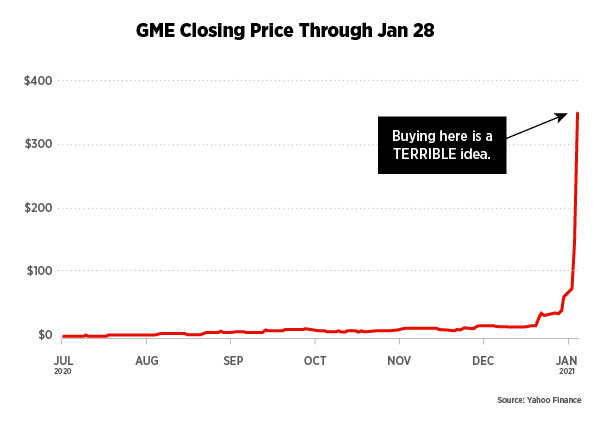What is GameStop and why does everyone care?
GameStop is a brick-and-mortar video game chain that lost business to online downloads. Business worsened during the pandemic. Like many distressed companies, it was targeted by short sellers betting that the stock’s price would fall.1
Basically, short sellers do the opposite of most investors. They try to make money when a stock’s price falls. They borrow shares from their brokerage for a fee, immediately sell them, and plan to buy them back later at a lower price when the price falls. Shorting is a strategy used by certain types of hedge funds.
What’s a short squeeze?
Shorting stocks is risky since any positive news or interest in a company can drive the stock’s price up. When short sellers bet wrong and a stock’s price rises, they can be forced to buy shares at higher prices to cover their losses (or pony up more collateral).
A squeeze happens when short sellers scramble to buy shares to cover their positions when the stock price is rising. The more investors who buy and hold those shares, the harder it is for short sellers to find shares to buy (exposing them to potentially huge losses).
With me so far?
Where does Reddit come in?
After it became clear that short sellers were betting on GameStop’s demise, the company became the focus of amateur traders on the WallStreetBets forum on Reddit, a community of chatrooms and forums.
By banding together and coordinating buying activity, these small-time traders boosted the stock’s price far above what the company’s financial fundamentals support, putting pressure on the hedge funds betting the other way.2
The stock went viral.
Why?
Social media chatter + free trading apps like Robinhood + bull market + new investors with time on their hands = FRENZY
Is it illegal? That’s a stretch. These armchair traders are egging each other into speculative bets, but I don’t think it rises to the level of illegal market manipulation. However, regulators might feel differently.
Some securities lawyers say the commentary and coordination apparent on WallStreetBets could be grounds for a market-manipulation case. The SEC has declined to say whether it has opened a formal enforcement investigation of this week’s trading. Manipulation cases are generally difficult for the SEC to bring because they require showing that stock promoters or traders misled the market through statements or the pattern of their transactions.
Is it bad for markets? The battle between gleeful amateurs pushing prices up and hedge funds scrambling to force prices down has led to some of the highest volume trading days on record and cost short sellers billions.3
Some fear that big losses for short sellers could force them to sell other stocks, causing downward pressure on the broader market.
Is this David vs. Goliath?
Many of these small traders are angry at the perception that “Wall Street” is pulling strings and using their connections to hurt mom-and-pop investors. They see this as an opportunity to stick it to the big-money pros by using their own strategies against them.
It’s new school vs. old school. Rebels vs. the Empire. Bueller vs. Principal Rooney. Reddit vs. CNBC.
So, should I be investing in GameStop?
No. GameStop’s stock is massively inflated and trading has been halted multiple times because of its meteoric rise.4 At this point, it looks like folks are piling in just to say they were there.

When the bubble bursts, it’ll be a rush to sell and many GameStop holders will end up losing most of their investment.
(It might already be happening by the time you read this.)
We’ve seen frenzies like this many times before, such as Tulip mania in the 1630s, the Nifty Fifty in the 1970s, and the dot-coms in the 1990s. We’ll see more in the future.
Why are people angry at Robinhood?
Amid the buying frenzy, Robinhood and other popular brokerage platforms suddenly restricted trading on several red-hot stocks, including GameStop.5
Traders were furious, and that’s probably putting it lightly. Protests erupted from investors, many market pros (not the short sellers, obviously), lawmakers and more. Robinhood was hit by at least two customer lawsuits.
Although I dislike brokers limiting trading in a security, brokerage firms have their own financial and regulatory obligations that can constrain their ability to leave trading completely open. For example, Robinhood needed to raise $1 billion to shore up its ability to clear and execute trades in Gamestop and other popular, volatile stocks before allowing clients to resume trading today.
Brokerage firms, like Robinhood, can be held financially responsible for completing trades when their clients can’t cover losses. In addition, brokerage firms can be held responsible for allowing clients to take excessive risk for their situation.
Nevertheless, it’s understandable that people are frustrated by brokerage outages and difficulty trading.
Still, it’s amazing that a bunch of regular folks with small trading accounts can bring massive institutional investors to their knees.
What are the implications of this frenzy?
No one can predict the future with certainty, but a few things are likely. Most bubbles end naturally when the euphoria turns to panic, folks start selling, and the price crashes.
However, it’s also possible that regulators will step in if they think there’s risk to markets or they see too many investors getting hurt.
Gamestop investments will end in tears for many folks caught up in it.
Markets could see some wild swings and pull back from their highs, but I don’t see major risk yet.
We will be left with some pressing questions once the dust settles.
Will social media traders continue to drive big market moves?
Are coordinated moves by small investors a danger to markets?
Should regulators limit the amount of risk hedge funds can take?
Please contact me if you have questions or would like to discuss your financial future.
1https://www.morningstar.com/articles/1019249/what-the-heck-is-going-on-with-gamestop
3https://www.ft.com/content/56658052-76fe-4910-8cb7-810039753f7c
5https://www.cnbc.com/2021/01/28/robinhood-customer-sues-trading-app-over-gamestop-restrictions.html
Risk Disclosure: The content is developed from sources believed to be providing accurate information; no warranty, expressed or implied, is made regarding accuracy, adequacy, completeness, legality, reliability or usefulness of any information. Consult your financial professional before making any investment decision.



0 Comments